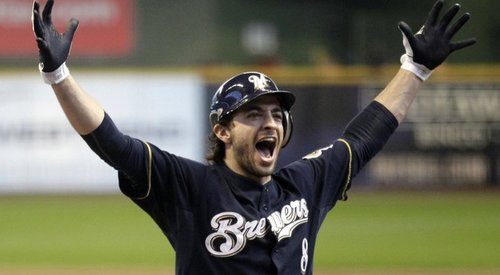
Biogenesis, steroids and a Ryan Braun suspension?
It looks like Major League Baseball finally got their man, and 19 others to boot.
Following the 2011 season Ryan Braun was named National League MVP. Later still in 2011, word leaked to ESPN that Braun had tested positive for performance-enhancing drugs and would receive a 50-game suspension to begin 2012.
Then Braun became the first player in MLB history to successfully appeal a positive drug test, utilizing a chain-of-custody argument that many considered at the time to be nothing more than a technicality. After a second player utilized the same argument to appeal a 100-game suspension, Major League Baseball fired the arbitrator that cast the deciding vote.
In February of this year Braun’s name was linked to Biogenesis, a Miami-area laboratory alleged to have distributed performance-enhancing drugs to a number of Major Leaguers. Unlike most players listed in the lab’s records however, Braun’s name was not listed next to any specific drugs, and Braun’s camp claimed they had utilized Biogenesis as experts to help craft their defense of the 2011 charges.
Since then Major League Baseball has been dogged in their pursuit of Braun and others, including Alex Rodriguez.
[php snippet=1]
In March the league filed a suit against Biogenesis claiming that the lab had caused Major League Baseball damages by interfering with MLB’s drug program, an odd lawsuit that, if allowed to proceed would have granted Major League Baseball the ability to subpoena records from Biogenesis, as well as the ability to compel depositions, all of which could be used to punish the players in question.
Now it looks like none of that may be necessary, as Biogenesis founder Tony Bosch has agreed to cooperate with Major League Baseball’s investigation. Braun and Rodriguez are facing 100-game suspensions, while around 18 others are facing first-time 50-game suspensions. Depending on the appeals process, the suspensions may not begin until 2014.
But what does this episode mean for baseball going forward?
First and foremost, the quality and quantity of the players is unlike anything MLB has faced since putting their drug policy in place. Since 2005, only 30 Major Leaguers have been suspended for performance-enhancing drugs, while even the biggest names like Rafael Palmeiro and Manny Ramirez got suspended near the ends of their careers, long after the peak of their powers.
Now 20 more names could be added to the list, including All-Stars such as Robinson Cano, Nelson Cruz and Gio Gonzalez (although it should be noted that records obtained by ESPN indicate that Gonzalez was only given legal supplements by the clinic) to go along with a perennial MVP contender in Braun. The 2013 and 2014 seasons could be drastically altered with so many key contributors on the shelf.
Perhaps more intriguing going forward is how Major League Baseball pursued Braun and what it means moving forward. Bud Selig and the league showed a willingness to do whatever they had to in order to catch a player they felt had cheated. When they didn’t have subpoena power, they found a way to sue that would allow them such powers, all while keeping in contact with Bosch and others at Biogenesis in an effort to get someone to cooperate.
For over a year, Major League Baseball chased Ryan Braun, even after an independent arbitrator had lifted his suspension in a way that followed MLB protocol. While it appears that they were right in this instance-or at least a further case was there to be made-one has to wonder how this incident will affect the faith of Major League players when it comes to dealing with the league and the appeals process going forward.
It is clear that the stain of the steroid era has not yet left the mind of Bud Selig or the other higher-ups in Major League Baseball, nor should it. The league looked the other way when all signs pointed to unnatural performance, choosing instead to enjoy record revenue and ratings produced by a national fascination with the long ball. At the time it seemed like a good idea, a way to recover from a strike that nearly crippled MLB forever.
Now the sins of the past have made fans skeptical of all they see, less willing to accept feats of superhuman coordination and strength at face value. Those fans demand a clean game, the type of game that produced heroes of the past such as Ruth and Aaron, and the fact that Barry Bonds may forever reign as the home run champion makes the blood of many boil, and one suspects that includes more than a few people in the Commissioner’s Office.
What we are seeing is a league trying to make up for past mistakes, a league trying to rectify a broken legacy by any means necessary.
And honestly, it is difficult to predict how that will end. This most recent example may serve as an effective warning to future players about the lengths Major League Baseball will go to in order to keep the game clean, a deterrent to future cheating. At the same time it could sow dissonance between the players and the league, widening an already large divide between those on the field and those in the luxury boxes.
Only time will tell which direction this saga will go, but by the end of the 2014 season we should at least have an idea.
[php snippet=1]

